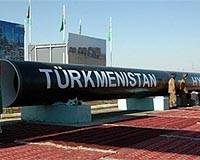 |
Washington DC (UPI) Jun 08, 2009 After years of stalemates, Iran and Pakistan formally signed bilateral agreements in Istanbul on the so-called Peace Pipeline from the South Pars gas field. The Iran-Pakistan-India gas pipeline will bring gas from the South Pars field in Iran, one of the largest gas fields in the world, to markets in Pakistan and India. The reserves in the offshore South Pars field are estimated at 450 trillion cubic feet of natural gas, or about 47 percent of the total gas reserves in Iran. Pakistan and Iran had move aggressively on the pipeline plans in recent weeks, leaving India's role in doubt. The Pakistan Interstate Gas Co. and the Iranian National Oil Co. signed the agreements in a late Friday ceremony in Istanbul as Turkey will govern the terms agreement, reports the Pakistani Daily Times. Iran will supply more than 750 million cubic feet of gas per day for the Pakistani generation of some 5,000 megawatts of energy under the terms of the 25-year contract. Pakistan is looking for a major economic boost from the project, with oil and gas reserves in Balochistan province expected to attract investors to the deal. The IPI project was envisioned in 1994, though negotiations have limped along for decades because of pricing disputes and security concerns in territory along the intended route. The Istanbul agreement sets the price of gas at 25 percent that of world crude oil prices.
Iran funds Armenian oil pipeline Armenian Energy Minister Armen Movsisyan said the funding of the pipeline from Tabriz in northern Iran to Eraskh along the Armenia border with Azerbaijan reflects Tehran's recognitions of Yerevan's financial struggles. The project will go forward with the understanding that Yerevan will repay its share of the pipeline project. Iranian officials are preparing to head to the Armenian capital to make final cost estimates and conclude outstanding agreements on the project, the Georgian daily The Messenger reports. In a project that supplies Armenia with the equivalent gas volumes it has received from Georgia, Iran and Armenia began construction on the 70-mile Iran-Armenia gas pipeline earlier this year. Armenia will convert the natural gas from that pipeline to electricity, which it will export back to Iran.
Bickering over Alaska pipeline Sen. Lisa Murkowski, R-Alaska, said despite political bickering in the state capital, there is enough White House support for the project to push it through the federal process, The Anchorage Daily News reports. TransCanada won a state license from Alaska along with $500 million in perks to construct the pipeline, while BP and ConocoPhillips are pushing for a rival project called Denali. Sen. Mark Begich, D-Alaska, said Washington has expressed frustration that the project was moving too slowly, suggesting the White House would take the project out of state hands. Republican Gov. Sarah Palin and her supporters, meanwhile, remained adamant the program was moving forward, suggesting the slow development of immediate gains was overshadowing long-term potential. Murkowski, for her part, said there was no room for "finger pointing" in the project, seemingly backing Palin in her reference to a huge energy bill under negotiation among state lawmakers that includes financing measures for the North Slope project. "We're doing something here, it's good news, I think it's significant and I think it will help to facilitate the project -- whichever project it is," Murkowski said. Apart from costs and government obstacles, critics point to technological developments that make gas extraction from shale deposits in the Lower 48 a possible alternative to the North Slope project. Share This Article With Planet Earth
Related Links Powering The World in the 21st Century at Energy-Daily.com
 Analysis: China wins Turkmen gas contract
Analysis: China wins Turkmen gas contractWashington (UPI) Jun 8, 2009 Of the four new states bordering the Caspian that emerged from the 1991 breakup of the Soviet Union, the Russian Federation, Azerbaijan and Kazakhstan have all ramped up their oil production to significant levels. Turkmenistan, the Caspian's fourth post-Soviet state, is less endowed with oil but richly endowed with natural gas. Since the unexpected death on Dec. 21, 2006, of ... read more |
|
| The content herein, unless otherwise known to be public domain, are Copyright 1995-2009 - SpaceDaily. AFP and UPI Wire Stories are copyright Agence France-Presse and United Press International. ESA Portal Reports are copyright European Space Agency. All NASA sourced material is public domain. Additional copyrights may apply in whole or part to other bona fide parties. Advertising does not imply endorsement,agreement or approval of any opinions, statements or information provided by SpaceDaily on any Web page published or hosted by SpaceDaily. Privacy Statement |